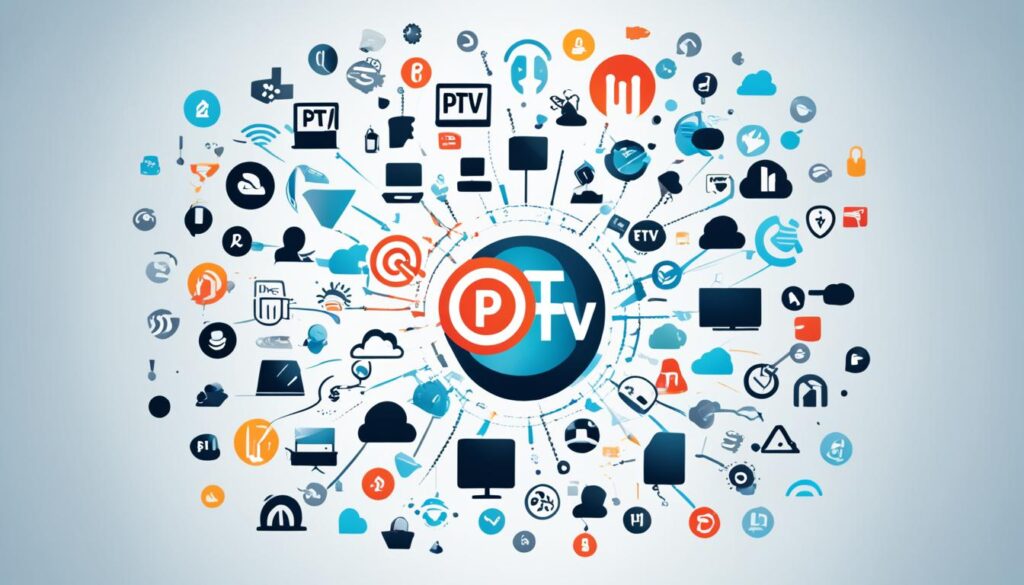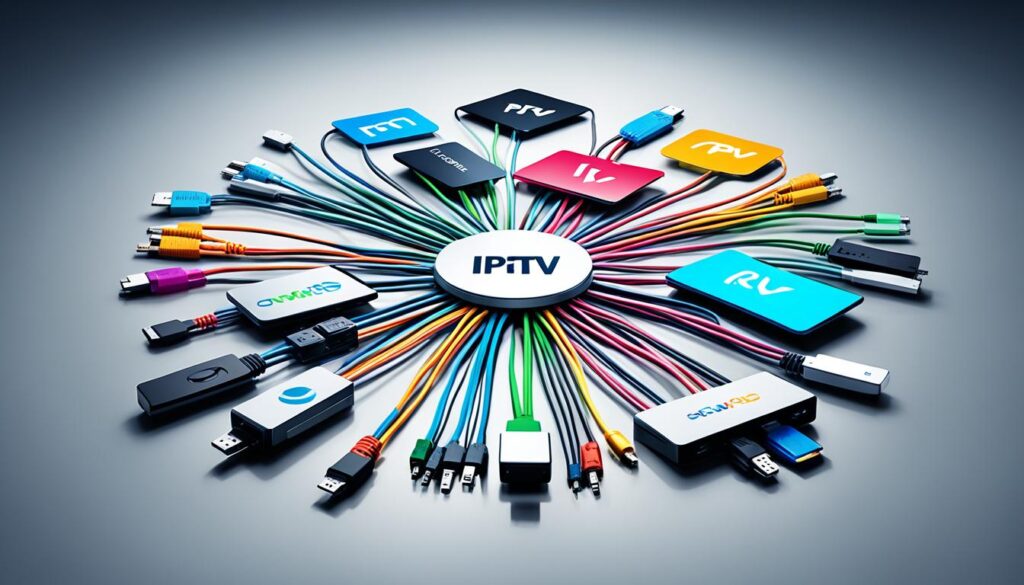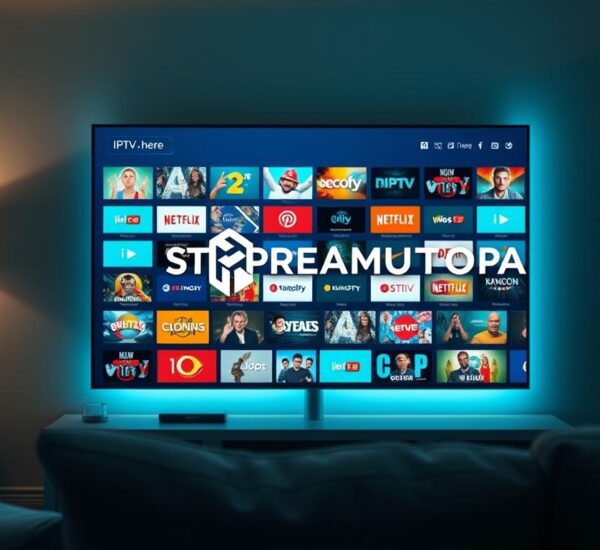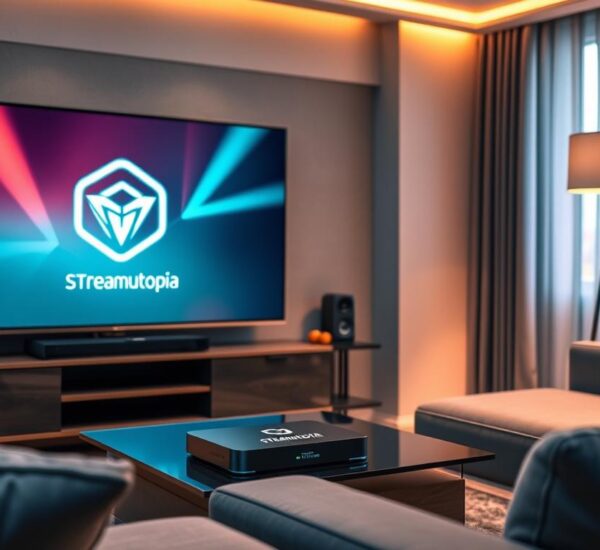Ever found yourself watching your favorite show, only to see it freeze and a spinning wheel appear? IPTV buffering issues are more than just annoying. They show problems that can ruin your streaming fun. As IPTV gets more popular, knowing how to fix these problems is key to enjoying your shows.
Slow internet is often the main cause of these pauses. So, what speed do you need for smooth streaming? For standard quality, you’ll want at least 5Mbps. For 720p HD, 10Mbps is enough. But if you’re into 1080p or 4K, you’ll need 20Mbps or 30Mbps respectively12.
This info helps us dive into IPTV buffering issues, their causes, and how to fix them. It’s all about making your streaming smoother and more enjoyable.
Key Takeaways
- IPTV buffering can significantly disrupt viewing experiences.
- Understanding required internet speeds is crucial for optimal streaming quality.
- Common causes of buffering include slow internet and hardware limitations.
- Effective solutions can minimize buffering issues, enhancing user satisfaction.
- Exploring specific remedies can empower users to improve their streaming performance.
Understanding IPTV and Its Popularity
Internet Protocol Television, or IPTV, is a new way to watch TV. It lets users stream shows over the internet. This makes watching TV more flexible and convenient for people all over the world.
Having fast and reliable internet is key for IPTV. You need at least 7–10 Mbps for smooth streaming without delays3. People like watching live shows and on-demand content that fits their busy lives. IPTV offers a wide range of content, making it more appealing than traditional cable TV.
Many IPTV services have strong infrastructure for great viewing experiences4. They use advanced tech to solve problems like server overloads and bandwidth issues. This ensures smooth streaming. As more people switch to IPTV, the need for reliable and quality services keeps growing. This marks a big change in how we watch media today.
What is Buffering in IPTV?
Buffering in IPTV means the video pauses temporarily. It’s done to load data into memory for smooth watching. This happens during the IPTV buffering process, where data is moved and stored before showing.
Users often see progress bars like 75% or 100% during this time. It means data is getting ready for viewing. Buffering can happen if internet speeds are slow or bandwidth is limited, especially when many people are online.
This can lead to frustrating streaming stops. To avoid these issues, having a strong internet connection is key. Using a wired setup can also help keep things stable.
Services like StreamUtopia can reduce buffering. They do this by improving server performance and managing bandwidth well. For the best IPTV streaming, you need an internet speed of 7-10 Mbps for downloads.
Buffering gets worse during busy internet times, like from 6 to 11 p.m. when lots of people are online567.
Common IPTV Buffering Issues
IPTV users often face buffering problems that cause streaming interruptions at the worst times. These issues include freezing and lagging, especially on devices like FireStick, Smart TVs, and PCs. Users get really upset when their favorite shows stop or start late.
To watch IPTV smoothly, you need internet speeds of 5Mbps for standard quality or 30Mbps for 4K. If your internet is slow, you’ll get constant buffering. This is a big problem, making up nearly half of all streaming complaints, especially in the evenings and on weekends18. Using a wired connection is better than wireless, which helps avoid buffering problems18.
Network congestion is another big issue. IPTV providers with poor infrastructure can’t handle many users, causing more problems for their customers1. Over 60% of buffering issues come from too many users on the internet, making IPTV less enjoyable8.
To fix these issues, check your device settings and improve your internet connection. For more tips, like upgrading your hardware and making sure apps work right, see this guide on fixing IPTV problems.
Causes of IPTV Buffering Problems
IPTV buffering problems can come from many things that affect streaming quality. A big cause is slow internet speeds. You need at least 7-10 MBPS for smooth streaming9. If your internet is slow, you might see buffering a lot because the stream can’t keep up10.
Network congestion also plays a big part in these issues. If many devices are using the internet at once, buffering is more likely9.
The IPTV service quality can also cause problems. If many people are streaming at the same time, it can lead to buffering9. Old routers or devices might not handle streaming well, causing buffering10. Bad Wi-Fi signals and poor network connections can make things worse, causing more interruptions.
To make streaming better, clear your cache and cookies, update apps and devices, and use fewer devices at once. These steps can help fix buffering from system overload9. If you’re always getting buffering from slow internet, think about getting faster internet10.

IPTV Buffering Issues: Causes and Effective Solutions
IPTV users often face buffering problems due to several factors. Knowing what causes these issues can help find solutions. This part talks about key factors that affect IPTV performance. These include internet speed, network congestion, and hardware recommendations.
Impact of Internet Speed on IPTV Streaming
Internet speed is key for IPTV streaming. You need at least 10 Mbps for smooth streaming without buffering11. Aim for 7-10 Mbps download and 1-3 Mbps upload speeds for the best quality5. If your internet speed is low, you might get buffering due to data packet delays.
Network Congestion and Its Effects
Network congestion happens a lot during busy times, making streaming poor. To fix this, prioritize traffic to give IPTV streams enough bandwidth5. Waiting a few hours might help, as network traffic changes throughout the day.
Hardware Limitations Affecting Streaming Quality
Choosing the right hardware is crucial for good streaming. Use updated IPTV apps like TiviMate or IPTV Smarters for better quality11. A wired connection is also better than Wi-Fi for stable streaming5. Clearing the app’s cache and adjusting DNS settings on Wi-Fi can also improve performance.
| Factor | Optimal Requirement | Recommendation |
|---|---|---|
| Internet Speed | 10 Mbps minimum | Aim for 7-10 Mbps download; 1-3 Mbps upload5 |
| Connection Type | N/A | Use wired connection instead of Wi-Fi5 |
| IPTV App | Updated versions | Utilize apps like TiviMate or IPTV Smarters11 |
| Network Traffic | N/A | Implement traffic prioritization5 |
How to Troubleshoot IPTV Buffering
Fixing IPTV buffering starts with checking your internet connection. A slow connection can ruin your streaming. Use speed tests to see if your internet meets the IPTV’s needs, usually 7-10 Mbps for downloads and 1-3 Mbps for uploads12. Think about using Ethernet instead of Wi-Fi for a more stable connection2.
Close apps that use a lot of bandwidth in the background. Keeping your IPTV device’s software up to date is crucial. Outdated versions can cause buffering problems. Try restarting your router and modem to clear up network issues2.
Changing your video quality settings can help too. For basic streaming, you need internet speeds of 5–10 Mbps. HD streaming requires 20–25 Mbps2. If your Samsung TV with Roku has buffering problems, check your settings. Using a dual-band router or adjusting Wi-Fi channels can improve your connection.Check here for additional helpful tips.

Best Practices for Reducing IPTV Buffering
To cut down on IPTV buffering, make smart choices about internet plans and connections. Picking the right internet package is key to a good streaming experience. Look for plans that offer enough speed, especially during busy times when lots of people stream in high definition. You’ll need at least 10 Mbps for HD and more for 4K to avoid buffering13.
Choosing the Right Internet Plan
Choosing the right internet plan is vital to reduce IPTV buffering. You should get internet speeds of 7-10 Mbps for downloads and 1-3 Mbps for uploads for smooth streaming5. If you watch in high resolution like 1080p or 4K, you’ll need faster speeds because it uses more data. For example, 4K streaming needs about 25 Mbps for the best quality13. Peak hours, from 6 to 11 p.m., can make bandwidth scarce, leading to buffering issues6.
Utilizing Wired Connections for Stability
Using a wired connection can solve many streaming problems. Ethernet cables offer a more stable connection than Wi-Fi, making streaming better13. Wired connections are faster and less likely to be affected by interference from your home. Also, setting up Quality of Service (QoS) can help manage your network, giving priority to IPTV and reducing buffering when it’s busy5. If you’re always buffering with satellite internet, switching to fiber-optic or high-speed cable might help a lot and cut down on interruptions6.
| Internet Speed Recommendation | Usage Type | Recommended Speed (Mbps) |
|---|---|---|
| Standard Definition Streaming | General viewing | 3 |
| High Definition Streaming | Movies & shows | 10 |
| 4K Ultra HD Streaming | High-quality viewing | 25 |
| Buffer-Free Experience | General consumption | 10+ |
By thinking about these factors and improving your network, you can greatly reduce IPTV buffering. This ensures a smooth viewing experience5.
IPTV Buffering Solutions: Equipment and Software
Improving your IPTV experience means looking at your devices and apps. Regular software updates for devices like the Firestick can really help with buffering. It’s key to keep your device updated for smooth streaming of high-quality content over the internet.
Updating Your IPTV Device Firmware
Updating your IPTV device’s firmware is key for better streaming settings. This often fixes bugs and boosts performance to reduce buffering. Check your device’s settings for updates and apply them to improve your device and streaming services.
For a smooth experience, make sure your device works well with video codecs and adaptive bitrate streaming. This ensures you don’t face buffering issues.
Optimizing Your IPTV App Settings
Adjusting your IPTV app settings can cut down on buffering. Clear app caches and turn off apps you’re not using to save resources. Adjust streaming quality based on your internet speed to avoid problems.
If your internet can handle it, go for the highest quality setting for the best experience. Using a wired connection instead of Wi-Fi can also help reduce buffering. This makes streaming much smoother.Learn more about fixing buffering issues and see how these changes can improve your Firestick streaming.

| Action | Description | Impact |
|---|---|---|
| Update Firmware | Check for and apply the latest firmware updates for your IPTV devices. | Enhances compatibility and performance. |
| Clear Cache | Regularly clear app caches to free up resources. | Improves app responsiveness and reduces freezing. |
| Use Wired Connection | Connect your IPTV device directly to the router using an Ethernet cable. | Stabilizes the internet connection, reducing buffering. |
| Close Background Apps | Shut down apps that are not in use to free up memory and processing power. | Improves performance and reduces potential interruptions. |
Keeping your IPTV devices updated and tweaking your app settings are key to less buffering. By doing these things, you can make sure your streaming is stable and fun for all your favorite shows14151.
Using a VPN to Minimize Buffering
Using a VPN for IPTV can make streaming much better. A VPN makes a secure tunnel for your data, which is great for IPTV services16. It encrypts your data on the way to the internet, making it faster and safer from hackers16. VPNs also stop internet service providers from slowing down your internet by watching what you do online16.
A good VPN helps improve streaming quality by stopping ISPs from slowing down your internet when you stream a lot16. This is super useful if many people use the same connection, as it can slow things down a lot. A VPN changes your IP address, making it seem like you’re using the VPN server instead of your own network16.
When picking a VPN for IPTV, go for a paid one instead of a free one. Free VPNs might not be safe, work slowly, and have lots of ads16. Paid services like Surfshark have fast servers and strong security, keeping speed loss to just 10-20%17. It’s a good idea to look for features like DNS leak protection and strong encryption when choosing a VPN16.
Choosing a server that’s closer to you can make your connection faster, so try that out17. Using protocols like WireGuard gives you the fastest speeds, perfect for streaming17. Connecting via a wired network instead of wireless can also cut down on delays, making your IPTV better17. Using a VPN the right way can make streaming more private and reliable, cutting down on buffering and making it more fun.
StreamUtopia: A Reliable IPTV Service Option
StreamUtopia is becoming a top choice for IPTV services. It offers flexible plans for different viewer needs. The focus is on quality and making sure customers are happy. This means viewers get to watch their favorite shows without any breaks.
StreamUtopia’s setup is built to handle lots of streaming at once. It uses fast servers with 24 cores CPU and 256GB RAM. This setup ensures smooth streaming, even when many people are watching at the same time18.
To enjoy StreamUtopia fully, you should have at least 20 Megabits internet speed for SD, HD, and FHD content. Using a wired connection is best for less lag and reliability18. If you’re using wireless, keep your IPTV device close to the router and pick the right band for your setup to avoid buffering.
StreamUtopia lets you stream on one device at a time, unless stated otherwise. Knowing these limits helps make sure you get the best streaming experience19. If streaming issues happen, try checking your internet speed and make sure your devices and connections are set up right.

Choosing StreamUtopia means getting a dependable IPTV service that cares about your viewing experience. It’s all about giving users what they want and need. StreamUtopia is a standout in the IPTV market because of its focus on performance and customer happiness.
Adjusting Video Quality to Improve Performance
Changing video settings is key to better streaming and smooth playback. If videos buffer a lot, try lowering the video quality. This is especially helpful if your internet speed is slow. For example, you need about 5 Mbps for SD video, 10 Mbps for HD, and 25 Mbps for 4K20.
Changing how you set up video quality can really change how you watch videos. Make sure your Wi-Fi signal is strong. If it’s weak, try using a wired connection. Wired connections are more stable and don’t get interrupted as much, making streaming better21.
If videos keep buffering, try restarting your devices and clearing app caches. Make sure other apps aren’t using too much bandwidth while you stream. Lowering video quality can also stop playback from stopping, making it smoother22.
In short, making small changes to video settings can greatly improve streaming and performance. These tweaks help fix buffering and make watching videos better overall.
Change IPTV Providers for Better Service
Buffering issues can really ruin your TV time. That’s why switching IPTV providers might be a good idea. It’s key to look into IPTV service quality when you’re facing ongoing problems. Checking out customer support and how reliable a service is helps you find reliable streaming options.
Speed matters for IPTV streaming. You need at least 5Mbps for standard quality. But for better quality like 720p, 1080p HD, or 4K, you’ll need 10Mbps, 20Mbps, or 30Mbps, respectively1. If your current provider can’t keep up, it’s time to look elsewhere.
Some IPTV providers struggle with network congestion, especially during busy times1. This means you might get buffering. Choosing a quality provider is important for a smooth streaming experience. They usually offer consistent speed and support great streaming.
Before switching, check out what other users say and make sure you have enough bandwidth. Look at different packages to find one that fits your needs. For example, FibreStream has plans starting at 100 Mbps, which can improve your streaming21.
Using a wired connection is better than Wi-Fi for IPTV. A stable setup can make a big difference in your viewing experience. Switching to a new provider could really upgrade your TV time21.

| Provider | Minimum Speed Required | Speed Offered | Streaming Quality |
|---|---|---|---|
| Provider A | 5 Mbps | 100 Mbps | HD, 4K |
| Provider B | 10 Mbps | 50 Mbps | HD |
| Provider C | 20 Mbps | 75 Mbps | 1080p |
| Provider D | 30 Mbps | 150 Mbps | 4K |
Think about these points to get a better IPTV experience with a new provider. Keeping IPTV service quality in mind is smart when looking for a change.
Looking at your options can help you find the best streaming setup. This can make your IPTV experience much better.
Conclusion
Buffering in IPTV often causes problems for users, making streaming less smooth. The main reasons for buffering are slow internet, unstable connections, too many users on the server, and device issues23. To fix this, it’s important to improve internet speed, set up routers correctly, and use wired connections21.
Keeping an eye on network traffic and doing regular maintenance can also help stop buffering23. By using these tips, viewers can make their IPTV streaming better. This leads to a more enjoyable time watching shows and movies.
FAQ
What causes buffering issues in IPTV?
How can I fix IPTV buffering problems?
What is the minimum internet speed required for smooth IPTV streaming?
Are there any best practices to reduce IPTV buffering?
Can using a VPN help with IPTV buffering?
Is it worth switching IPTV providers if buffering issues persist?
How often should I check my IPTV device and internet connection?
What should I look for in an IPTV service provider to avoid buffering?
Source Links
- How to Fix IPTV Buffering and Freezing Issues (2024) – https://www.firesticktricks.com/iptv-buffering-and-freezing.html
- How do I fix my IPTV from buffering/freezing? – https://medium.com/@dias226/how-do-i-fix-my-iptv-from-buffering-freezing-580b0f58b273
- Why My IPTV Freezes And Buffers — Digitalizard – https://medium.com/@pixel.officiel123/why-my-iptv-freezes-and-buffers-digitalizard-83b0fc461a21
- The End of Buffering? How IPTV Services Tackle Lag and Delays? – https://medium.com/@mendoza48/the-end-of-buffering-how-iptv-services-tackle-lag-and-delays-f072bc013571
- Troubleshooting IPTV Freezing and Buffering Issues – https://digitalizard.com/why-my-iptv-freezes-and-buffers-digitalizard/
- How to Stop Buffering: Learn to Prevent Internet Video Buffering Issues | SatelliteInternet.com – https://www.satelliteinternet.com/resources/how-to-stop-buffering/
- IPTV Buffering: Causes and Solutions – Xtrix TV – https://xtrixtv.co.uk/fix-iptv-buffering/
- How to Fix Common IPTV buffering Issues | catchon tv – https://catchoniptv.com/how-to-fix-common-iptv-buffering-issues
- IPTV keeps Buffering? Causes, Fixes, and Prevention Tips – https://staticiptv.us/iptv-keeps-buffering/
- How to Fix Constant Buffering on My Smart IPTV App – https://medium.com/@buyiptvm3u/how-to-fix-constant-buffering-on-my-smart-iptv-app-7a81f64b59ec
- Resolve IPTV buffering or freezing issues. – Knowledgebase – https://streamq.tv/knowledgebase/4/Resolve-IPTV-buffering-or-freezing-issues..html
- What is IPTV? How To Solve IPTV Buffering or Freezing? – http://fmuser.org/news/IPTV-encoder/How-to-solve-Iptv-freezing-or-sound-issues/
- Improving Your Home Network for Buffer-Free IPTV Streaming in 2023 – https://medium.com/@iptv-provide.com/improving-your-home-network-for-buffer-free-iptv-streaming-in-2023-b256f2d8e903
- How To Minimize Video Buffering Issues While Streaming? – Muvi One – https://www.muvi.com/blogs/minimize-video-buffering-issues/
- How to Fix IPTV Buffering on Firestick: Proven Solutions [2024] – IPTVNOW Store – https://iptvnow.store/how-to-fix-iptv-buffering-on-firestick-2024/
- VPN for IPTV: Do you really need it? – https://nordvpn.com/blog/vpn-for-iptv/?srsltid=AfmBOoovHRXz-PdQ6qQ0aH7raWRFLSKanxqGY4BMTGsztv5vk0y4TLzA
- Slow VPN? Try these 8 tips to speed it up – Surfshark – https://surfshark.com/blog/tips-on-how-to-boost-vpn-speed
- Fix IPTV buffering and throttling – https://www.fastip.tv/iptv-buffering
- How can I stop Apple TV from buffering? – https://discussions.apple.com/thread/254764864
- How to stop buffering on Firestick (Common issues and fixes) – https://www.comparitech.com/tv-streaming/stop-firestick-buffering/
- Troubleshooting Your IPTV Connection: Tips and Support for Uninterrupted Streaming – https://getmaxtv.com/iptv-troubleshooting-and-support/
- How to Stop Video Buffering – 10 Effective Techniques To Reduce Buffering – OTTVerse – https://ottverse.com/how-to-stop-video-buffering/
- Buffering in IPTV – https://buyiptvservice.medium.com/buffering-in-iptv-96d2538e1ddf






